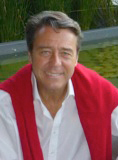Luminal surface of pulsatile VAD covered with endothelial cells successfully tested in vivo
A protocol to isolate a pure population of primary endothelial cells from sheep long saphenous veins was developed. The derived endothelial cells were characterized by checking the expression of endothelial specific markers (i.e. VE-cadherin).
In the ensuing phase in-vitro tests were performed to evaluate the functionality of endothelial monolayers of ovine origin using a combined bioreactor mimicking the loading conditions (in terms of wall shear stress and deformation) expected in functioning pulsatile ventricular assist devices (pVADs). Endothelial monolayers were placed on the surface of an elastomeric membrane in contact with a selected geometrical pattern that improves endothelial cell adhesion and functionality.
Based on these protocols and validations, in-vivo experiments in large animals (sheep) were performed (acute conditions, 3-5 hours). Endothelial monolayers were introduced in static conditions to cover the hyperelastic hybrid membrane in the new pVAD that was actuated at increased frequency (multiples of the heart rate) allowing for a decreased stroke volume.
The reconstituted tissue was fully retained upon pump actuation in vivo and no signs of luminal thrombosis were detected in the end-point analysis.
News!!! This document is stored in the ETH Web archive and is no longer maintained !!!
Prof. Peter Zilla nominated scientific advisor of the Hybrid Membrane project
 Professor Peter Zilla
Professor Peter Zilla
Department Head – Chris Barnard Division of Cardiothoracic Surgery
University of Cape Town – South Africa
A world renowned clinical scientist who has pioneered the field of tissue engineering and prosthetic cardiovascular implants. He performed his research activities between Austria (at the University of Vienna), Switzerland (at the University of Zurich) and South Africa (at the University of Cape Town) and developed innovative approaches to in vitro endothelialization which, for the first time ever, incorporate cell culture laboratories in operating theatres. In particular, he developed a method of culturing the patient own endothelial cells on prosthetic surfaces. His work in the field has broad scientific and clinical impact as demonstrated by the highly cited publications and plenary talks at tissue engineering conferences.His current focus is toward the improvement of heart valve prostheses. His work addresses the cure of young patients from developing countries and has already achieved the dramatic reduction of prosthetic degeneration for these procedures. The world-wide reach of his work in research and clinical practise, together with the experience matured in the field, corroborate our enthusiasm in welcoming Prof. Zilla in the Zurich Heart initiative.